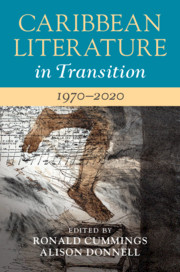Book contents
- Caribbean Literature in Transition, 1970–2020
- Caribbean Literature in Transition
- Caribbean Literature in Transition, 1970–2020
- Copyright page
- Contents
- List of Illustrations
- Contributors
- Acknowledgements
- Introduction: Caribbean Assemblages, 1970s–2020
- Part I Literary and Generic Transitions
- Part II Cultural and Political Transitions
- Part III The Caribbean Region in Transition
- Chapter 15 The Caribbean and Britain
- Chapter 16 Acts of Trespass and Collapsing Borders: Alternate Landscapes in Contemporary Caribbean-Canadian Literature
- Chapter 17 The Caribbean and the United States
- Chapter 18 The Caribbean and the Tourist Gaze
- Chapter 19 Caribbean Subjects in the World
- Part IV Critical Transitions
- Bibliography
- Index
Chapter 18 - The Caribbean and the Tourist Gaze
from Part III - The Caribbean Region in Transition
Published online by Cambridge University Press: 16 December 2020
- Caribbean Literature in Transition, 1970–2020
- Caribbean Literature in Transition
- Caribbean Literature in Transition, 1970–2020
- Copyright page
- Contents
- List of Illustrations
- Contributors
- Acknowledgements
- Introduction: Caribbean Assemblages, 1970s–2020
- Part I Literary and Generic Transitions
- Part II Cultural and Political Transitions
- Part III The Caribbean Region in Transition
- Chapter 15 The Caribbean and Britain
- Chapter 16 Acts of Trespass and Collapsing Borders: Alternate Landscapes in Contemporary Caribbean-Canadian Literature
- Chapter 17 The Caribbean and the United States
- Chapter 18 The Caribbean and the Tourist Gaze
- Chapter 19 Caribbean Subjects in the World
- Part IV Critical Transitions
- Bibliography
- Index
Summary
The essay surveys a broad selection of literary responses to tourism, which plays a significant role in the Caribbean. While the tourism economy is not inconsequential, the authors in focus tend to portray the commercialization and commodification of the archipelago, often marketed through the fantasy of paradise islands, in a negative light. Targeting the ‘leisure imperialism’ of tourism ideology, they trace an unsettling legacy in which the violent past of sugar and slavery survives in the smiling servitude of industrialized tourism. The superficial discourse of love and peace, the hedonism imposed on the sunny tropics, the supposedly willing sycophancy of the locals eager to please wealthy tourists are all dismantled through humour and dark satire to reveal a bleak underside of drugs, sex, exploitation, antipathy and social rot. However, calls for responsible, ‘slow’ tourism more beneficial to the locals hope that the industry may be ethically operated.
Keywords
- Type
- Chapter
- Information
- Caribbean Literature in Transition, 1970–2020 , pp. 300 - 315Publisher: Cambridge University PressPrint publication year: 2021

